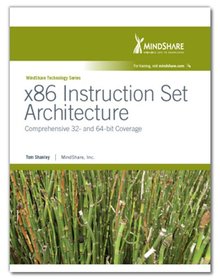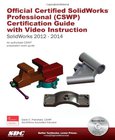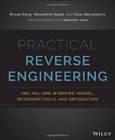x86 Instruction Set Architecture

Book Details:
| Publisher: | MindShare Press |
| Series: | MIX |
| Author: | Tom Shanley |
| Edition: | 1 |
| ISBN-10: | 0977087859 |
| ISBN-13: | 9780977087853 |
| Pages: | 1568 |
| Published: | Jan 31 2010 |
| Posted: | May 13 2017 |
| Language: | English |
| Book format: | |
| Book size: | 14.93 MB |
Book Description:
The Instruction Set Architecture, or ISA, is defined as that part of the processor architecture related to programming, including the native data types, instructions, registers, addressing modes, memory architecture, interrupt and exception handling, and external IO. With the exception of some small deviations and differences in terminology, all Intel and AMD x86 processors share a common ISA. This book focuses on those shared attributes (it does not cover those areas where the two companies have chosen widely divergent solutions which, by definition, fall outside of the ISA specification). If you re looking for a comprehensive book designed to bootstrap you up quickly on virtually all aspects of the x86 32/64-bit Instruction Set Architecture (ISA), we respectfully ask you to consider this book. Essential topics covered include: Basic Terms and Concepts Operating Mode/SubMode Introduction A (very) Brief History State After Reset Intro to the IA-32 Ecosystem Instruction Set Expansion 32-bit Machine Language Instruction Format Real Mode (8086 Emulation) Legacy x87 FP Support Introduction to Multitasking Multitasking-Related Issues Summary of the Protection Mechanisms Protected Mode Memory Addressing Code, Calls and Privilege Checks Data and Stack Segments IA-32 Address Translation Mechanisms Memory Type Configuration Task Switching Protected Mode Interrupts and Exceptions Virtual 8086 Mode The MMX Facilities The SSE Facilities IA-32e OS Environment IA-32e Address Translation Compatibility Mode 64-bit Register Overview 64-bit Operands and Addressing 64-bit Machine Language Instruction Format 64-bit Odds and Ends Transitioning to Protected Mode Transitioning to IA-32e Mode Introduction to Virtualization Technology System Management Mode (SMM) Machine Check Architecture (MCA) The Local and IO APICs
Download Link:
Related Books:
Official Certified SolidWorks Professional Certification Guide (CSWP) with Video Instruction
SolidWorks 2012-2014
This book, along with the companion disc that accompanies it, will provide you with a wealth of information about the three segments of the CSWP CORE exam. The intended audience for this book is a person who has passed the CSWA exam and who has eight or more months of SolidWorks training and usage. This guide is not intended to teach you how to use SolidWorks, but is written to provide you with CSWP exam tips, hints and information on sample questions and categories that are aligned with the exam. This guide is written to help you take and pass the CSWP exam. This book comes with a companion DVD containing segment videos for you to follow while you use the book. Each segment video provides valuable information, tips and tricks to successfully pass ...
X86 Assembly Language and C Fundamentals
The predominant language used in embedded microprocessors, assembly language lets you write programs that are typically faster and more compact than programs written in a high-level language and provide greater control over the program applications. Focusing on the languages used in X86 microprocessors, X86 Assembly Language and C Fundamentals explains how to write programs in the X86 assembly language, the C programming language, and X86 assembly language modules embedded in a C program. A wealth of program design examples, including the complete code and outputs, help you grasp the concepts more easily. Where needed, the book also details the theory behind the design. Learn the X86 Microprocessor Architecture and Commonly Used Instructions Assembly...
Practical Reverse Engineering
X86, x64, ARM, Windows Kernel, Reversing Tools, and Obfuscation
Analyzing how hacks are done, so as to stop them in the futureReverse engineering is the process of analyzing hardware or software and understanding it, without having access to the source code or design documents. Hackers are able to reverse engineer systems and exploit what they find with scary results. Now the good guys can use the same tools to thwart these threats. Practical Reverse Engineering goes under the hood of reverse engineering for security analysts, security engineers, and system programmers, so they can learn how to use these same processes to stop hackers in their tracks.The book covers x86, x64, and ARM (the first book to cover all three); Windows kernel-mode code rootkits and drivers; virtual machine protection techniques; and much...
2007 - 2021 © eBooks-IT.org



